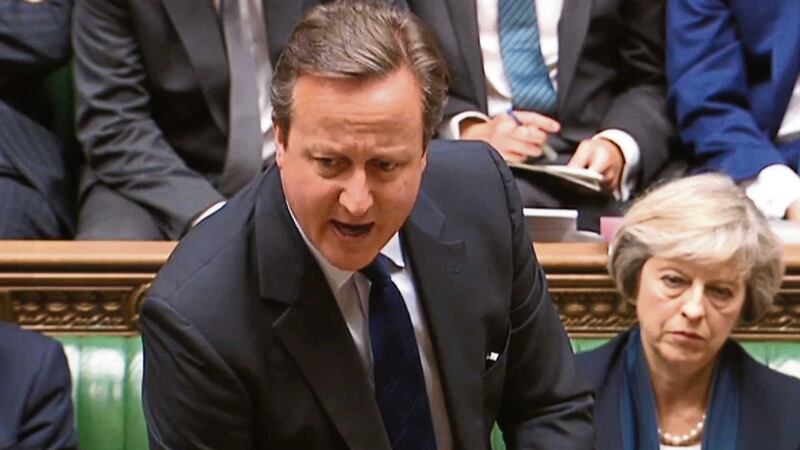Tory machinations were a major factor in the break-up of the United Kingdom 100 years ago and now this seems to have been added to our ‘decade of centenaries’. Historians will marvel at the casual arrogance of David Cameron in proceeding with such a momentous referendum for such trivial party management reasons. The poll was only promised in 2013 to placate Conservative MPs spooked by the rise of Ukip. It was scheduled for after the 2015 general election because Cameron clearly did not expect to be in a position to deliver it. When he won his surprise majority and Ukip’s vote stalled, the prime minister could simply have turned around to his rebels and told them circumstances had changed. What is the worst they could have done, given that they would hardly have brought down their own government? They might have plotted from the backbenches to turn Cameron into John Major but Major only ever put his own job on the line. Cameron gambled with the country - and lost.
**
If Sinn Féin’s call for a border poll does not destabilise the shiny new Stormont executive, all the other votes we are now facing should do the trick. The SNP has said it wants a second Scottish independence referendum within the two-year timeframe for leaving the EU. There may well be an imminent general election, which re-opens the question of the unionist pact - an especially thorny question for Fermanagh-based Arlene Foster. Precedent suggests the UK’s exit deal could be the subject of another European referendum and of course Ireland’s minority government could collapse at any moment, putting Sinn Féin back in all-Ireland campaigning mode.
**
The DUP took out an expensive four page wrap-around ‘Leave’ ad in the Metro newspaper, which is not distributed in Northern Ireland. This raised the suspicions of the UK media, which asked if the ad was an electoral expenses dodge after realising that political donors have unique secrecy in this part of the world. However, the UK media did not notice this secrecy is maintained by secretary of state and prominent Tory Leaver Theresa Villiers. Everyone involved in this escapade may soon regret drawing so much attention to themselves.
**
Plans for Northern Ireland’s first joint faith school have been unveiled by the four main churches, merging two small primaries in Co Derry to avoid both closing due to falling rolls. This raises the question of why the Catholic Church is so hostile to a Catholic primary in Clintyclay, Co Tyrone, opting for integrated status due to falling rolls. There is no obvious difference between the joint faith and integrated models as both are based on a multi-denominational Christian ethos. It appears that the bishops can accept integration, but only if they instigate it.
**
Criminal legal aid reform has failed, according to the Audit Office, with costs still roughly the same £100m a year they were during its last report on the subject in 2011. Alliance former justice minister David Ford says the bill would be £150m a year by now if he had not put in the work that he did but while this is almost certainly true, it is not much of a valediction. His successor Claire Sugden will want to do better, which means taking more radical action than rate-cutting within the existing framework. Ford initially put the squeeze on the legal profession by threatening to fund community-based ‘legal clinics’ if solicitors and barristers did not accept lower fees. Is that an idea worth revisiting?
**
Stormont’s commissioner for public appointments, Judena Leslie, has complained about the presence of only one woman on the executive’s new commission for flags and identity, saying it “runs counter to participative democracy.'' This is an interesting turn of phrase. Participative democracy was the academic basis of the civic forum, the unelected second chamber inserted into the Good Friday Agreement at the behest of the Women’s Coalition, whose chair Monica McWilliams distinguished the concept from “the more traditional representative democracy that is visited upon the electorate” by being based “not on the assumption of an undifferentiated humanity but rather in the assumption that there are group differences.” In other words, participative democracy runs counter to democracy.
**
Sinn Féin infrastructure minister Chris Hazzard says he needs to “explore innovative solutions” to maintaining grass verges, which are being cut only once a year across most of Northern Ireland due to financial constraints. An obvious innovation would be leaving people alone if they clear dangerous growth themselves, as the DUP’s Carla Lockhart says residents in her north Armagh constituency are already doing. Such initiative risks all manner of official harassment, as well as conferring possible liability for accident claims. The complete inability of Stormont and the councils to sort out a similar issue with icy pavements is not a great omen.
newton@irishnews.com









